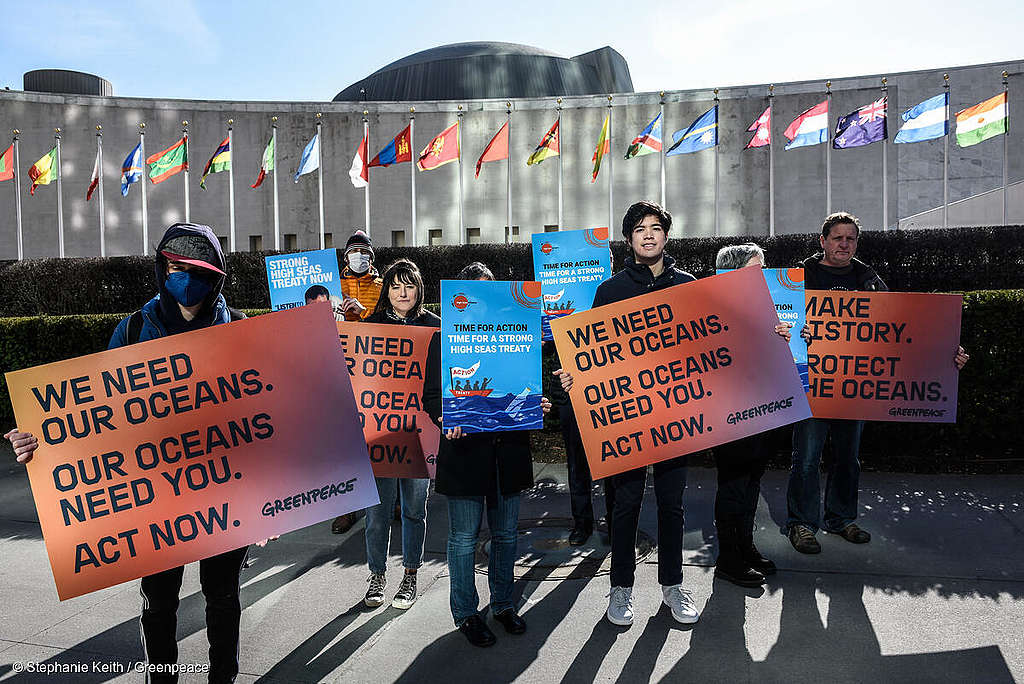Illegal, unreported, and unregulated (IUU) fishing is responsible for the loss of some 26 million tons of fish each year on the planet, according to the Food and Agriculture Organization (FAO) of the United Nations (U.N.). Only about 1 percent of the high seas are currently protected, Al Jazeera reported.
However, after nearly 20 years of talks, in early March, U.N. member countries finally reached a historic agreement to protect the world’s oceans. The Global Oceans Treaty aims to protect “30 percent of the oceans by 2030 […]. It provides a pathway to creating fully or highly protected areas across the world’s oceans,” international organization Greenpeace reported.
“International waters cover about 50 percent of the globe, an extensive area that’s difficult to protect, but this treaty gives us tools to do so,” Luisina Vueso, Greenpeace oceans campaign coordinator, told Diálogo on June 10. “Once the treaty is adopted by the U.N., it will be a great first step toward effectively protecting the oceans and curbing IUU fishing.”
The treaty will protect maritime areas not included in near-island waters, exclusive economic zones (EEZs), and states’ inland waters. The treaty will cover nearly two-thirds of the ocean outside national borders and will provide a legal framework for establishing extensive marine protected areas to preserve animal, plant, and ecosystem life, the National Geographic magazine reported.
Ocean predators
China has been singled out as the largest perpetrator of IUU fishing, devastating oceans with its massive distant water fishing fleets. According to the latest available IUU fishing index of Swiss nongovernmental organization (NGO) Global Initiative Against Transnational Organized Crime, China was the worst performer of the 152 countries surveyed, the Financial Times reported.
Meanwhile, U.S. ocean monitoring NGO Sea Shepherd Conservation Society, found that in the waters near the South Orkney Islands, some 600 km from Antarctica, Chinese krill trawlers have harmed several endangered species, including whales, seals, and penguins.

“Governments are showing willingness to move forward on this treaty and that’s a big step,” Vueso said. “Communities and public pressure play a critical role in moving this treaty forward.”
Far more than an environmental issue, IUU fishing is a threat to national security, facilitating transnational organized crime, as many large IUU fishing fleets engage in arms, drugs, and human trafficking; forced labor; corruption; and money laundering among other crimes, INTERPOL pointed out. It is also a hotbed for human rights abuses and fosters economic security threats.
In October 2022, the U.S. Interagency Working Group on IUU Fishing, a group established by the U.S. Congress and comprised of 21 agencies, chaired by the National Oceanic and Atmospheric Administration (NOAA), along with the U.S. State Department and Coast Guard, released its Five-Year National Strategy to Combat IUU Fishing, NOAA said.
The strategy details U.S. priorities and plans for the next five years to promote maritime security, including measures to increase government and regional capability to implement and enforce domestic regulations and international standards to mitigate the effects of IUU fishing.
In 2023, the Working Group engaged with five priority states: Ecuador, Panama, Senegal, Taiwan, and Vietnam, to support their efforts to combat IUU fishing and related threats. These countries were selected largely because of their willingness to take effective measures against IUU fishing activities and because they are located in regions identified as high risk for IUU fishing, among other criteria.
Latin American consciousness
Progress has already been seen in the region. To rigorously combat IUU fishing, Panama announced in early January the creation of an interinstitutional center that will contribute to the development of measures for the conservation and protection of the marine and coastal environment against this type of fishing and against the pollution of its waters.
Ecuador, which received a “yellow card” from the European Union for being considered a non-cooperative country in the fight against IUU fishing, is about to return to a “green card,” Ecuadorian newspaper El Universo reported on April 20.
Ecuador is “in the final stretch not only to get out of the yellow card, but to become the most traceable fishing sector in South America,” said Ecuadorian Minister of Production, Foreign Trade, Investment, and Fisheries Julio José Prado via Twitter.
The international conference Our Oceans, held in Panama in March 2023, headed by White House special envoy and former U.S. Secretary of State John Kerry, is testimony to the relevance that the protection of marine resources has gained. At the event, authorities and delegates from more than 190 countries adopted 341 commitments to protect the oceans.









